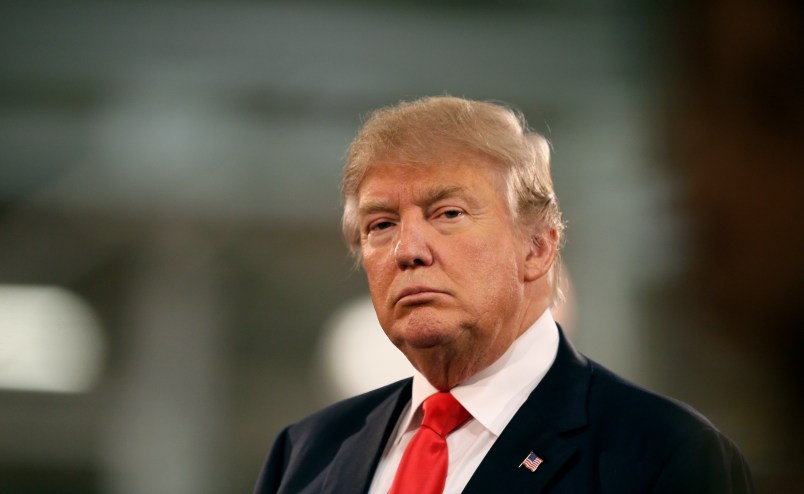As Donald Trump lurches toward a delegate count that would win him the GOP nomination, frightened Republicans have floated yet another alternative plan in the case that he tops the GOP’s 2016 ticket: a third party or independent bid by a respectable conservative who would give voters frustrated by the choice between Trump and Hillary Clinton another option.
It’s an idea that has been touted by #NeverTrump-ers like neocon Bill Kristol and Sen. Ben Sasse (R-NE) who want to stymie the damage they see Trump doing to their party but can’t bring themselves to vote for Clinton. A group of conservative activists and GOP operatives met in Washington last week to discuss the path forward if Republicans were to pursue that alternative. Trump, meanwhile, is warning such a scenario would “destroy the country.”
Experts in ballot access and independent presidential campaigns told TPM that, in a purely logistical sense, a third party or independent presidential bid is still feasible. But whether anti-Trump Republicans literally still have time to get a conservative alternative on the ballot almost misses the point. The effort, which will be costly and still needs big-bucks donors, comes with its own set of political risks that call into question the entire undertaking, including the very real possibility that it will make Hillary Clinton the next president.
“If you have the money, you can get just about anything or anyone on the ballot. And there’s plenty of time to do it now,” Dan Tokaji, a professor specializing in election law at The Ohio State University Moritz College of Law, told TPM. “It really is a question of whether this is something they want to do, because if Republicans put an alternative candidate that’s likely to ensure that Hillary Clinton is the next president, which is maybe a likely outcome anyway, but you virtually guarantee that if you had, say, a Mitt Romney, running as an independent candidate.”
According to Richard Winger, publisher of Ballot Access News, state laws vary considerably in terms of deadlines to get on the ballot and what’s required. There are often different deadlines when it comes to an independent candidate versus reserving a ballot spot for a third party, but nonetheless, he said, there’s time to make it happen.
“If you chose to the later deadline for each method,” Winger said, “they’re all in July, August and September, except there’s four states in June and then there’s Texas in May.
As for getting the petition signatures required by some states’ laws, Winger estimates that task would cost Trump foes $6 million total.
Which brings us to the next challenge: donors.
“A lot of it is going to depend on whether rich people are willing to bankroll the effort,” said John Pitney, a politics professor at Claremont McKenna College who has also served as research director at the Republican National Committee. “The question is, what’s the pay off? What’s the likelihood this person could actually get elected? Because if the idea is to prevent Donald Trump from becoming president, there’s a much simpler way of doing that. And that’s voting for Hillary Clinton.“
To convince donors the campaign is worth their contribution, you’ll need a strong candidate, Pitney said, which presents a “chicken and egg problem.”
“The effort is not going to be able to attract a good candidate unless they have the resources, but they’re not going to be able to get the resources without a good candidate,” Pitney said.
If the proponents of a third party effort are willing to admit that the candidate — whomever he or she is — has no chance of winning the White House, then it’s a matter of convincing donors that the ancillary benefits are worth betting on.
“It cuts to the question that, is it really worth a very, very large sum of money to make conservative voters feel better?” Pitney said.
But there’s also a down-the-ballot argument for fielding an alternative conservative candidate.
“Maybe that’s the strategy,” Tokaji said. “We put another candidate on the ballot realizing that it will hand the White House to Hillary in the hopes that it would at least get Republicans out to vote and save some people like, say, [Sen.] Rob Portman (R-OH), who is going to be in a competitive election.”
But there are still some potential downsides to contend with, particularly with future of the Republican Party so in flux.
“People who go outside of [the GOP] for this third party thing would be hoping to show they’re an important bloc that has to be respected and incorporated into the future party,” Phil Wallach, a senior fellow in governance studies at the Brookings Institution, told TPM. “There’s a danger, of course, that they would go outside and show themselves to be not such an important bloc, in which case their path to influence in the party might be unclear.”










